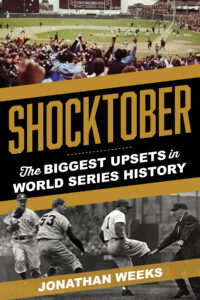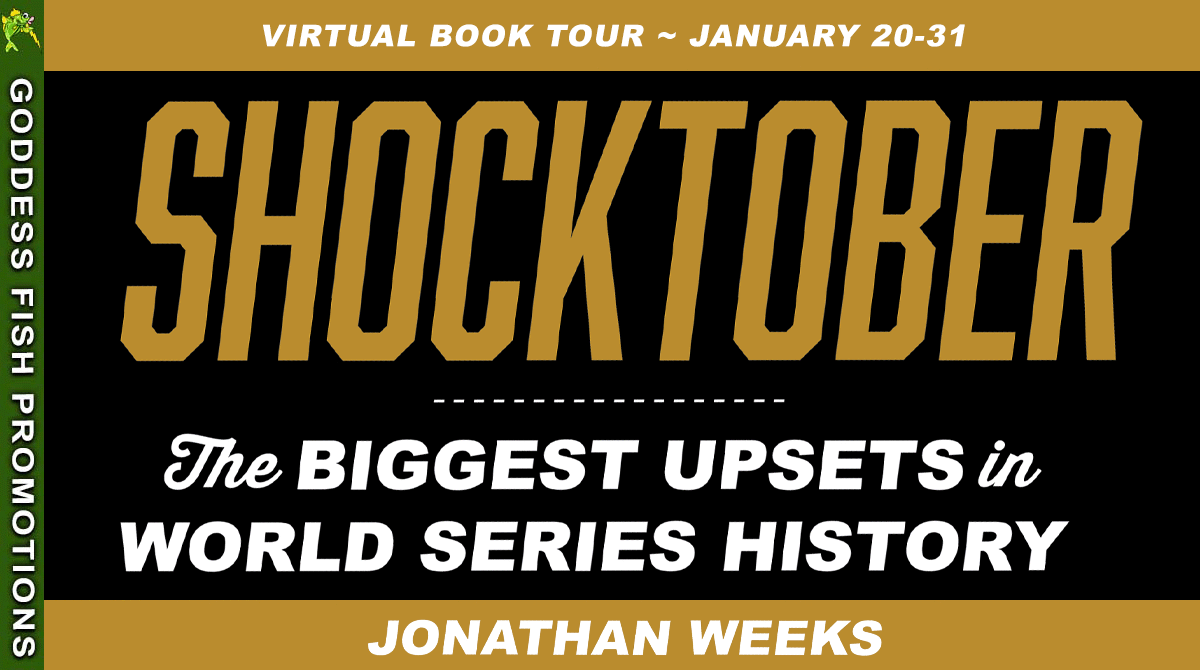Welcome back to sportswriter Jonathan Weeks! Today we’re chatting about his new sports biography, Shocktober: The Biggest Upsets in World Series History.
Past interviews with Jonathan include a focus on The Legend of the Mick: Stories and Reflections on Mickey Mantle, and Lore of the Bambino: 100 Great Babe Ruth Stories. Feel free to check them out!

During his virtual book tour, Jonathan will be giving away a $25 Amazon or Barnes and Noble (winner’s choice) gift card to a lucky randomly drawn participant. To be entered for a chance to win, use the form below. To increase your chances of winning, feel free to visit his other tour stops and enter there, too!
Bio:
Jonathan Weeks has written several sports biographies and two novels, one of which was a posthumous collaboration with his late father. He grew up in the Capital District region of New York State and currently works in the mental health field.
Welcome back, Jonathan. Please tell us about your newest release.
With just two exceptions, baseball’s World Series has been an annual event since 1903. Although some of the outcomes have been fairly predictable, there have been a number of twists and turns over the years. As the title of the book indicates, Shocktober examines the biggest upsets in World Series history—22 in all.
What inspired you to write this book?
I’ve been following the World Series since I was about eight years old. I’ve made a habit of rooting for the underdogs. I thought it might be fun to examine some of the World Series that had unexpected twists.
Excerpt from Shocktober:
Game 1 was held at Dodger Stadium with 56,000 fans in attendance. Since Hershiser had pitched in Game 7 of the NLCS, he was unavailable for the Series opener. Lasorda was forced to send rookie right-hander Tim Belcher to the mound while LaRussa had the luxury of starting a well-rested Dave Stewart. Perhaps feeling the pressure of the moment, Stewart hit Sax with the first pitch he threw, balked him to second base, and served up a two-run homer to Mickey Hatcher. Hatcher got the L.A. crowd worked up by rounding the bases at full speed. This prompted broadcaster Vin Scully to joke: “He’s a Saturday Evening Post character.” Regaining his composure, Stewart yielded just one more run over the next seven innings. Belcher had a rough go of it, staking the A’s to a 4-2 lead in the top of the second. The big blow was struck by Canseco—a grand slam to deep center field with two outs. The monster blast reportedly hit an NBC camera, leaving a dent. With the A’s nursing a 4-3 lead in the bottom of the ninth, the legend of Kirk Gibson was born.
Eckersley was summoned to close out the game for Oakland. He retired the first two batters before issuing a walk to pinch-hitter Mike Davis. Gibson, who was suffering from a pulled hamstring and strained knee ligaments, had been in street clothes at the start of the game. After a pair of cortisone shots, he was still limping, but feeling less pain. With the Dodgers trailing in the late innings, he pulled on his uniform and shuffled to the batting cage beneath the stadium for some practice swings. Summoned to pinch-hit for Alejandro Pena, he worked the count full. By his own admission, he was hoping at best for a blooper over the head of Oakland shortstop Walt Weiss. Essentially swinging on one leg, the ailing slugger did much better than that, pounding a backdoor slider into the right field bleachers for a walk-off homer.
“First of all, it was like almost some kind of foolish thing to go up there and hit because of the shape I was in,” Gibson reminisced years later. “…I remember when I was rounding the bases, my parents went through my mind. Throughout my career, there were a lot of doubters, a lot of people who directed a lot of criticism at me. People would say things to my dad, and initially, early in my career, they had to defend me. I told them, ‘You guys don’t have to defend me. I’m going to bust it and I’m going to fail sometimes. But we’ll have a laugh some day [and] it will all be worth it.’ When I [hit that home run], I thought, ‘This is the moment.’” Gibson’s moment—which came in his only at-bat of the Series—has appeared in virtually every October highlight anthology ever since. In 2016, Eckersley said he felt honored to be a part of Gibson’s achievement. “I’ve always had a respect for Kirk—the kind of player he was. And for something like that to happen to me, in that moment in baseball, was incredible…I can step away from that and appreciate it because I love this game.”
What’s the next writing project?
I haven’t made up my mind what I want to do next. I’m nearing retirement age and my career in the mental health field is winding down. I’ve been thinking about trying my hand at another novel. It’s been awhile since I’ve written any fiction and I’m sure I’ll be rusty. But I’d like to know if I still have it in me.
What is your biggest challenge when writing a new book? (or the biggest challenge with this book)
Whenever you are compiling tens of thousands of facts, it’s difficult to get everything right. Statistics are the language of baseball and typographical errors are common. As a sportswriter you have to be meticulous about getting your numbers right. For those who know baseball, there’s a big difference between a .342 and a .242 batting average.
If your novels require research – please talk about the process. Do you do the research first and then write, while you’re writing, after the novel is complete and you need to fill in the gaps?
I do my research one chapter at a time. I always have a rough idea of what I want to say in my head. I follow the facts where they lead me. Once I’ve gathered enough material, I start actually writing the chapter. If the chapter feels a bit too superficial, I do some more research.
What’s your writing space like? Do you have a particular spot to write where the muse is more active? Please tell us about it.
I have an office in my home. It’s full of baseball books and memorabilia. I have a bunch of autographed baseballs from members of the 1977 and 1978 World Series New York Yankee teams. There are also pictures of famous players on the walls.
What authors do you enjoy reading within or outside of your genre?
I read a lot of historical fiction. I particularly like Ken Follett and Conn Iggulden. I’m also a fan of horror/supernatural novels. In that genre, I like Stephen King, Shirley Jackson, and Jennifer McMahon. Anyone who wants to see what I’m reading can send me a friend request on Goodreads.
Anything additional you want to share with the readers today?
Nothing specific. I’m always happy to connect with readers. And I have never once turned down a request for a signed copy of one of my books.
Links:
Blog | Goodreads | Amazon
Thank you for coming back to Reviews and Interviews!
a Rafflecopter giveaway
